University of Suffolk BA Business Law and Ethics Essay: Brexit Impact
VerifiedAdded on 2022/11/24
|7
|2004
|266
Essay
AI Summary
This essay delves into the concept of parliamentary sovereignty, a cornerstone of the British constitution, highlighting its historical context and significance. It explains how the UK Parliament holds the highest legislative authority. The essay then examines the limitations to this sovereignty, particularly focusing on the impact of the UK's membership in the European Union and, subsequently, Brexit. It discusses how EU law and the Human Rights Act have challenged parliamentary supremacy, and analyzes the economic and political consequences of the UK's departure from the EU, including the devaluation of the pound, increased trade costs, and the notion of a 'global Britain.' The conclusion summarizes the key arguments, emphasizing the uncertainties and potential opportunities that have arisen from Brexit, while also acknowledging the economic challenges and the ongoing debate surrounding the UK's legal and political landscape.

Business Law and
Ethics
Ethics
Paraphrase This Document
Need a fresh take? Get an instant paraphrase of this document with our AI Paraphraser

Table of Contents
INTRODUCTION...........................................................................................................................3
MAIN BODY..................................................................................................................................3
CONCLUSION................................................................................................................................6
REFERENCES................................................................................................................................7
INTRODUCTION...........................................................................................................................3
MAIN BODY..................................................................................................................................3
CONCLUSION................................................................................................................................6
REFERENCES................................................................................................................................7
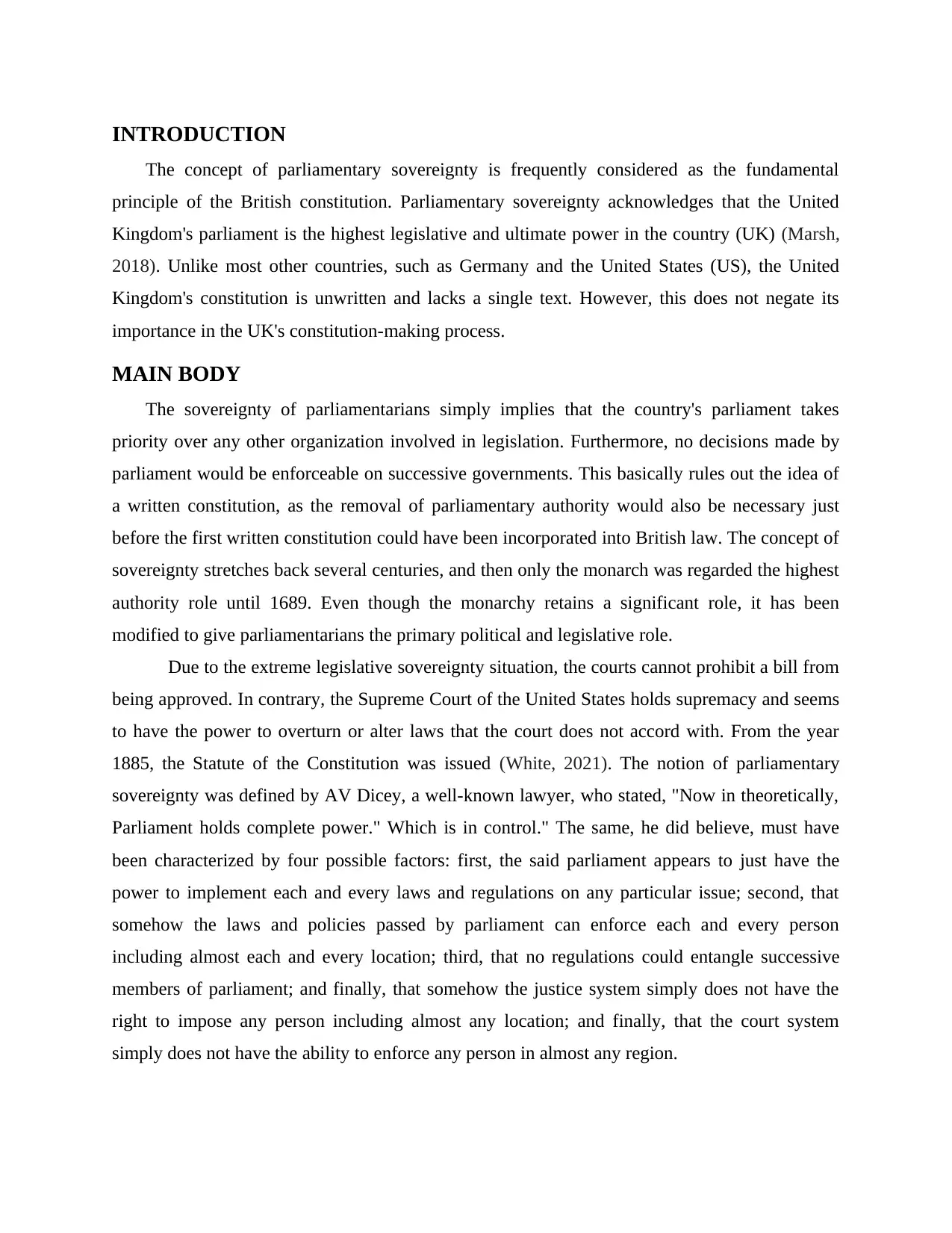
INTRODUCTION
The concept of parliamentary sovereignty is frequently considered as the fundamental
principle of the British constitution. Parliamentary sovereignty acknowledges that the United
Kingdom's parliament is the highest legislative and ultimate power in the country (UK) (Marsh,
2018). Unlike most other countries, such as Germany and the United States (US), the United
Kingdom's constitution is unwritten and lacks a single text. However, this does not negate its
importance in the UK's constitution-making process.
MAIN BODY
The sovereignty of parliamentarians simply implies that the country's parliament takes
priority over any other organization involved in legislation. Furthermore, no decisions made by
parliament would be enforceable on successive governments. This basically rules out the idea of
a written constitution, as the removal of parliamentary authority would also be necessary just
before the first written constitution could have been incorporated into British law. The concept of
sovereignty stretches back several centuries, and then only the monarch was regarded the highest
authority role until 1689. Even though the monarchy retains a significant role, it has been
modified to give parliamentarians the primary political and legislative role.
Due to the extreme legislative sovereignty situation, the courts cannot prohibit a bill from
being approved. In contrary, the Supreme Court of the United States holds supremacy and seems
to have the power to overturn or alter laws that the court does not accord with. From the year
1885, the Statute of the Constitution was issued (White, 2021). The notion of parliamentary
sovereignty was defined by AV Dicey, a well-known lawyer, who stated, "Now in theoretically,
Parliament holds complete power." Which is in control." The same, he did believe, must have
been characterized by four possible factors: first, the said parliament appears to just have the
power to implement each and every laws and regulations on any particular issue; second, that
somehow the laws and policies passed by parliament can enforce each and every person
including almost each and every location; third, that no regulations could entangle successive
members of parliament; and finally, that somehow the justice system simply does not have the
right to impose any person including almost any location; and finally, that the court system
simply does not have the ability to enforce any person in almost any region.
The concept of parliamentary sovereignty is frequently considered as the fundamental
principle of the British constitution. Parliamentary sovereignty acknowledges that the United
Kingdom's parliament is the highest legislative and ultimate power in the country (UK) (Marsh,
2018). Unlike most other countries, such as Germany and the United States (US), the United
Kingdom's constitution is unwritten and lacks a single text. However, this does not negate its
importance in the UK's constitution-making process.
MAIN BODY
The sovereignty of parliamentarians simply implies that the country's parliament takes
priority over any other organization involved in legislation. Furthermore, no decisions made by
parliament would be enforceable on successive governments. This basically rules out the idea of
a written constitution, as the removal of parliamentary authority would also be necessary just
before the first written constitution could have been incorporated into British law. The concept of
sovereignty stretches back several centuries, and then only the monarch was regarded the highest
authority role until 1689. Even though the monarchy retains a significant role, it has been
modified to give parliamentarians the primary political and legislative role.
Due to the extreme legislative sovereignty situation, the courts cannot prohibit a bill from
being approved. In contrary, the Supreme Court of the United States holds supremacy and seems
to have the power to overturn or alter laws that the court does not accord with. From the year
1885, the Statute of the Constitution was issued (White, 2021). The notion of parliamentary
sovereignty was defined by AV Dicey, a well-known lawyer, who stated, "Now in theoretically,
Parliament holds complete power." Which is in control." The same, he did believe, must have
been characterized by four possible factors: first, the said parliament appears to just have the
power to implement each and every laws and regulations on any particular issue; second, that
somehow the laws and policies passed by parliament can enforce each and every person
including almost each and every location; third, that no regulations could entangle successive
members of parliament; and finally, that somehow the justice system simply does not have the
right to impose any person including almost any location; and finally, that the court system
simply does not have the ability to enforce any person in almost any region.
⊘ This is a preview!⊘
Do you want full access?
Subscribe today to unlock all pages.

Trusted by 1+ million students worldwide
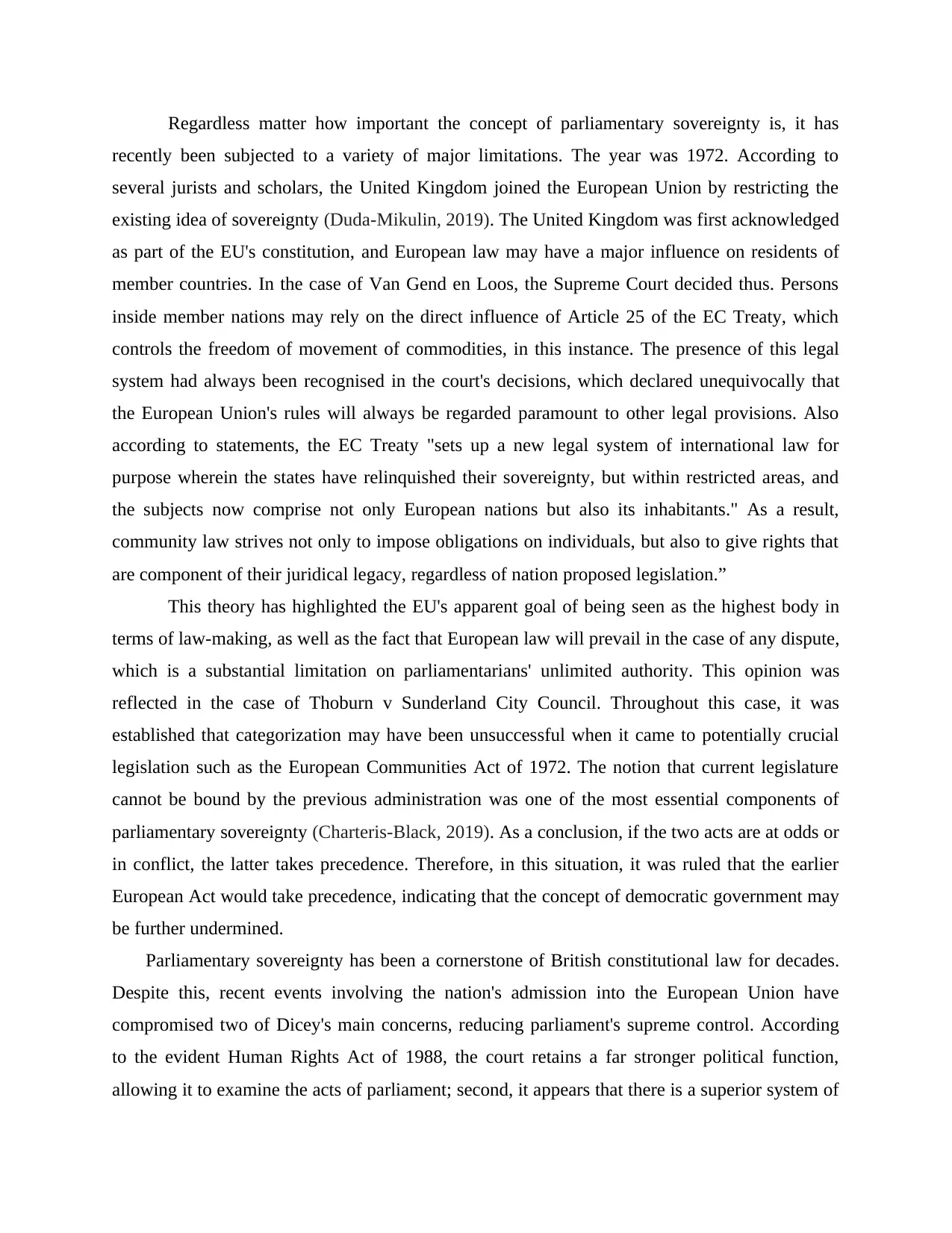
Regardless matter how important the concept of parliamentary sovereignty is, it has
recently been subjected to a variety of major limitations. The year was 1972. According to
several jurists and scholars, the United Kingdom joined the European Union by restricting the
existing idea of sovereignty (Duda-Mikulin, 2019). The United Kingdom was first acknowledged
as part of the EU's constitution, and European law may have a major influence on residents of
member countries. In the case of Van Gend en Loos, the Supreme Court decided thus. Persons
inside member nations may rely on the direct influence of Article 25 of the EC Treaty, which
controls the freedom of movement of commodities, in this instance. The presence of this legal
system had always been recognised in the court's decisions, which declared unequivocally that
the European Union's rules will always be regarded paramount to other legal provisions. Also
according to statements, the EC Treaty "sets up a new legal system of international law for
purpose wherein the states have relinquished their sovereignty, but within restricted areas, and
the subjects now comprise not only European nations but also its inhabitants." As a result,
community law strives not only to impose obligations on individuals, but also to give rights that
are component of their juridical legacy, regardless of nation proposed legislation.”
This theory has highlighted the EU's apparent goal of being seen as the highest body in
terms of law-making, as well as the fact that European law will prevail in the case of any dispute,
which is a substantial limitation on parliamentarians' unlimited authority. This opinion was
reflected in the case of Thoburn v Sunderland City Council. Throughout this case, it was
established that categorization may have been unsuccessful when it came to potentially crucial
legislation such as the European Communities Act of 1972. The notion that current legislature
cannot be bound by the previous administration was one of the most essential components of
parliamentary sovereignty (Charteris-Black, 2019). As a conclusion, if the two acts are at odds or
in conflict, the latter takes precedence. Therefore, in this situation, it was ruled that the earlier
European Act would take precedence, indicating that the concept of democratic government may
be further undermined.
Parliamentary sovereignty has been a cornerstone of British constitutional law for decades.
Despite this, recent events involving the nation's admission into the European Union have
compromised two of Dicey's main concerns, reducing parliament's supreme control. According
to the evident Human Rights Act of 1988, the court retains a far stronger political function,
allowing it to examine the acts of parliament; second, it appears that there is a superior system of
recently been subjected to a variety of major limitations. The year was 1972. According to
several jurists and scholars, the United Kingdom joined the European Union by restricting the
existing idea of sovereignty (Duda-Mikulin, 2019). The United Kingdom was first acknowledged
as part of the EU's constitution, and European law may have a major influence on residents of
member countries. In the case of Van Gend en Loos, the Supreme Court decided thus. Persons
inside member nations may rely on the direct influence of Article 25 of the EC Treaty, which
controls the freedom of movement of commodities, in this instance. The presence of this legal
system had always been recognised in the court's decisions, which declared unequivocally that
the European Union's rules will always be regarded paramount to other legal provisions. Also
according to statements, the EC Treaty "sets up a new legal system of international law for
purpose wherein the states have relinquished their sovereignty, but within restricted areas, and
the subjects now comprise not only European nations but also its inhabitants." As a result,
community law strives not only to impose obligations on individuals, but also to give rights that
are component of their juridical legacy, regardless of nation proposed legislation.”
This theory has highlighted the EU's apparent goal of being seen as the highest body in
terms of law-making, as well as the fact that European law will prevail in the case of any dispute,
which is a substantial limitation on parliamentarians' unlimited authority. This opinion was
reflected in the case of Thoburn v Sunderland City Council. Throughout this case, it was
established that categorization may have been unsuccessful when it came to potentially crucial
legislation such as the European Communities Act of 1972. The notion that current legislature
cannot be bound by the previous administration was one of the most essential components of
parliamentary sovereignty (Charteris-Black, 2019). As a conclusion, if the two acts are at odds or
in conflict, the latter takes precedence. Therefore, in this situation, it was ruled that the earlier
European Act would take precedence, indicating that the concept of democratic government may
be further undermined.
Parliamentary sovereignty has been a cornerstone of British constitutional law for decades.
Despite this, recent events involving the nation's admission into the European Union have
compromised two of Dicey's main concerns, reducing parliament's supreme control. According
to the evident Human Rights Act of 1988, the court retains a far stronger political function,
allowing it to examine the acts of parliament; second, it appears that there is a superior system of
Paraphrase This Document
Need a fresh take? Get an instant paraphrase of this document with our AI Paraphraser
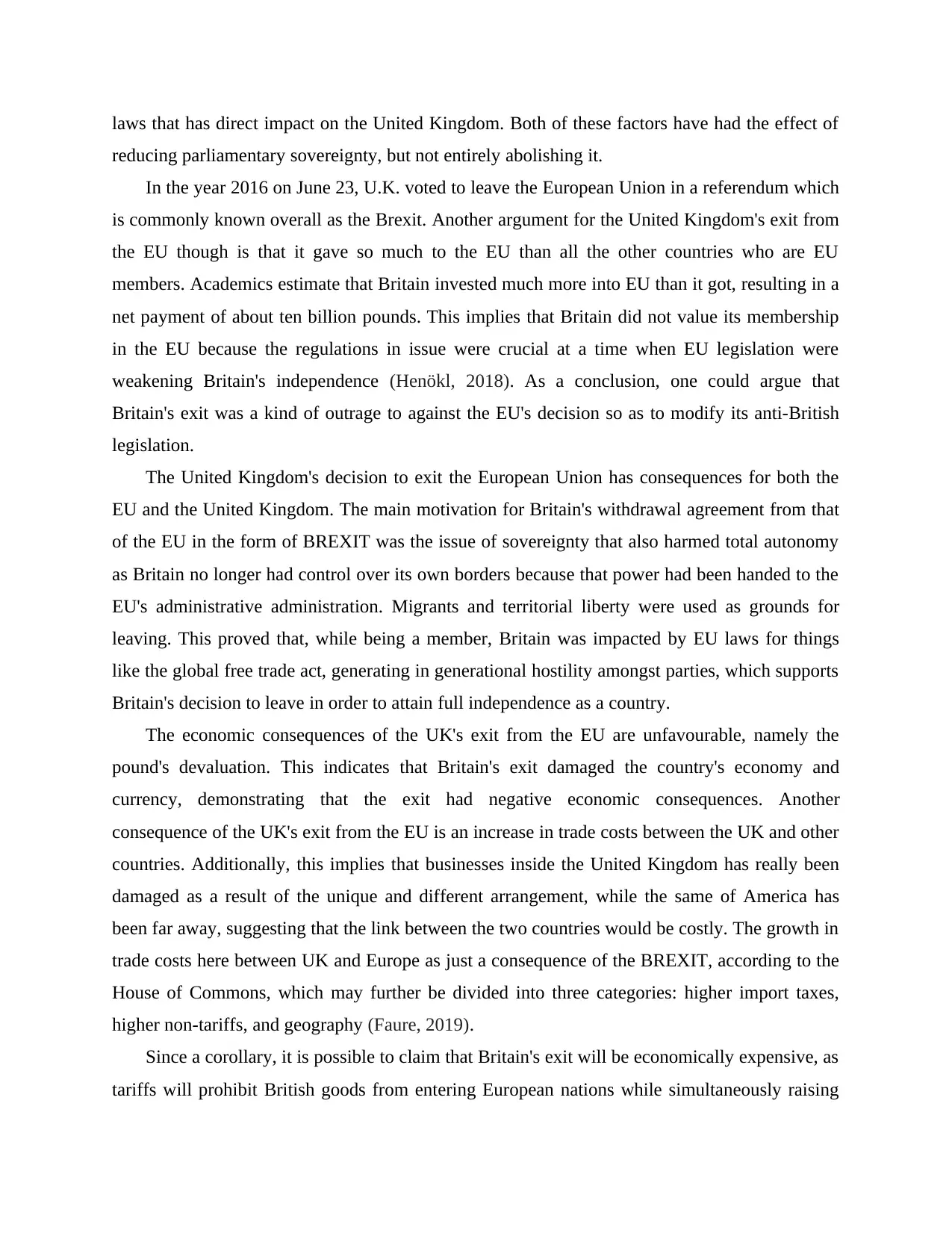
laws that has direct impact on the United Kingdom. Both of these factors have had the effect of
reducing parliamentary sovereignty, but not entirely abolishing it.
In the year 2016 on June 23, U.K. voted to leave the European Union in a referendum which
is commonly known overall as the Brexit. Another argument for the United Kingdom's exit from
the EU though is that it gave so much to the EU than all the other countries who are EU
members. Academics estimate that Britain invested much more into EU than it got, resulting in a
net payment of about ten billion pounds. This implies that Britain did not value its membership
in the EU because the regulations in issue were crucial at a time when EU legislation were
weakening Britain's independence (Henökl, 2018). As a conclusion, one could argue that
Britain's exit was a kind of outrage to against the EU's decision so as to modify its anti-British
legislation.
The United Kingdom's decision to exit the European Union has consequences for both the
EU and the United Kingdom. The main motivation for Britain's withdrawal agreement from that
of the EU in the form of BREXIT was the issue of sovereignty that also harmed total autonomy
as Britain no longer had control over its own borders because that power had been handed to the
EU's administrative administration. Migrants and territorial liberty were used as grounds for
leaving. This proved that, while being a member, Britain was impacted by EU laws for things
like the global free trade act, generating in generational hostility amongst parties, which supports
Britain's decision to leave in order to attain full independence as a country.
The economic consequences of the UK's exit from the EU are unfavourable, namely the
pound's devaluation. This indicates that Britain's exit damaged the country's economy and
currency, demonstrating that the exit had negative economic consequences. Another
consequence of the UK's exit from the EU is an increase in trade costs between the UK and other
countries. Additionally, this implies that businesses inside the United Kingdom has really been
damaged as a result of the unique and different arrangement, while the same of America has
been far away, suggesting that the link between the two countries would be costly. The growth in
trade costs here between UK and Europe as just a consequence of the BREXIT, according to the
House of Commons, which may further be divided into three categories: higher import taxes,
higher non-tariffs, and geography (Faure, 2019).
Since a corollary, it is possible to claim that Britain's exit will be economically expensive, as
tariffs will prohibit British goods from entering European nations while simultaneously raising
reducing parliamentary sovereignty, but not entirely abolishing it.
In the year 2016 on June 23, U.K. voted to leave the European Union in a referendum which
is commonly known overall as the Brexit. Another argument for the United Kingdom's exit from
the EU though is that it gave so much to the EU than all the other countries who are EU
members. Academics estimate that Britain invested much more into EU than it got, resulting in a
net payment of about ten billion pounds. This implies that Britain did not value its membership
in the EU because the regulations in issue were crucial at a time when EU legislation were
weakening Britain's independence (Henökl, 2018). As a conclusion, one could argue that
Britain's exit was a kind of outrage to against the EU's decision so as to modify its anti-British
legislation.
The United Kingdom's decision to exit the European Union has consequences for both the
EU and the United Kingdom. The main motivation for Britain's withdrawal agreement from that
of the EU in the form of BREXIT was the issue of sovereignty that also harmed total autonomy
as Britain no longer had control over its own borders because that power had been handed to the
EU's administrative administration. Migrants and territorial liberty were used as grounds for
leaving. This proved that, while being a member, Britain was impacted by EU laws for things
like the global free trade act, generating in generational hostility amongst parties, which supports
Britain's decision to leave in order to attain full independence as a country.
The economic consequences of the UK's exit from the EU are unfavourable, namely the
pound's devaluation. This indicates that Britain's exit damaged the country's economy and
currency, demonstrating that the exit had negative economic consequences. Another
consequence of the UK's exit from the EU is an increase in trade costs between the UK and other
countries. Additionally, this implies that businesses inside the United Kingdom has really been
damaged as a result of the unique and different arrangement, while the same of America has
been far away, suggesting that the link between the two countries would be costly. The growth in
trade costs here between UK and Europe as just a consequence of the BREXIT, according to the
House of Commons, which may further be divided into three categories: higher import taxes,
higher non-tariffs, and geography (Faure, 2019).
Since a corollary, it is possible to claim that Britain's exit will be economically expensive, as
tariffs will prohibit British goods from entering European nations while simultaneously raising
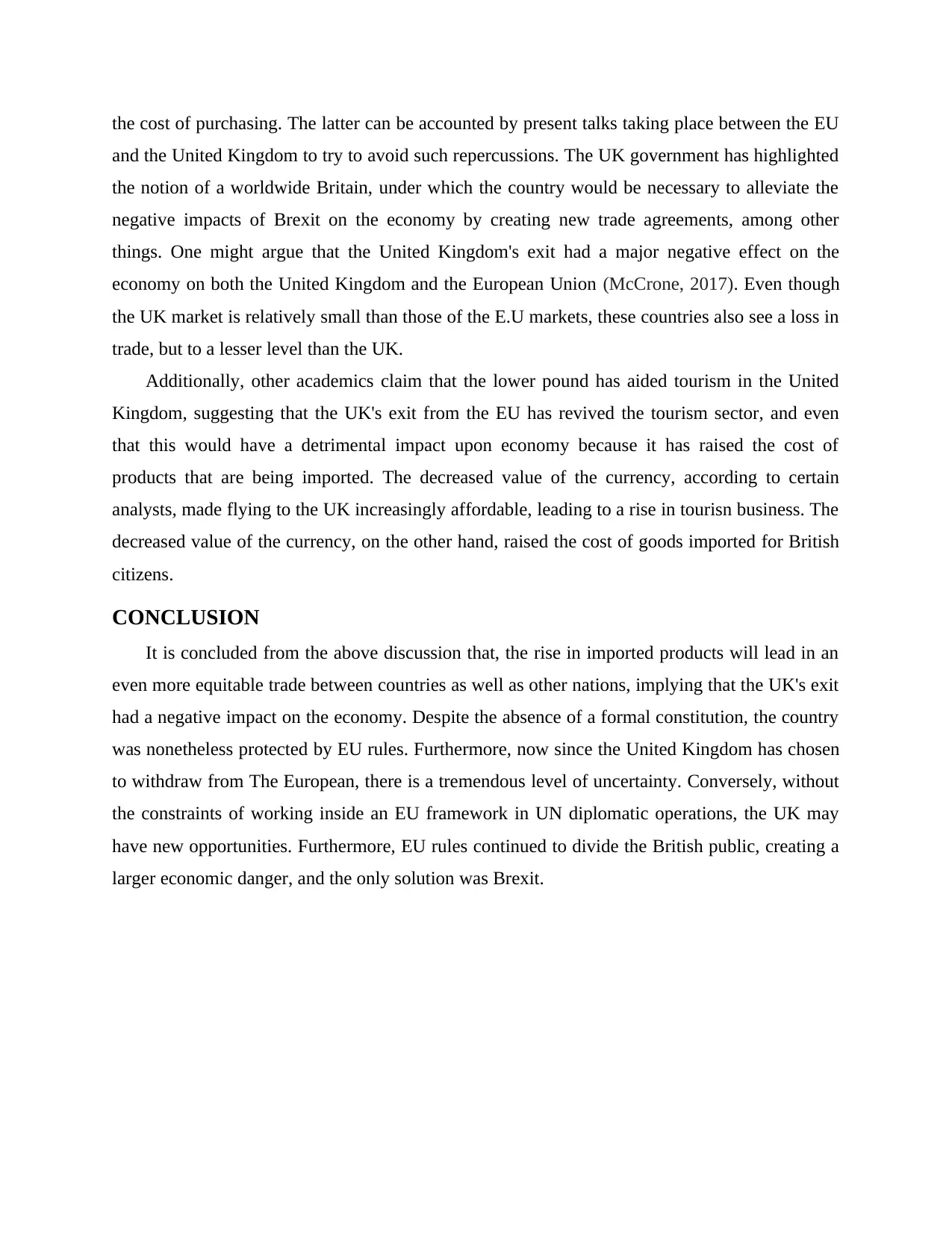
the cost of purchasing. The latter can be accounted by present talks taking place between the EU
and the United Kingdom to try to avoid such repercussions. The UK government has highlighted
the notion of a worldwide Britain, under which the country would be necessary to alleviate the
negative impacts of Brexit on the economy by creating new trade agreements, among other
things. One might argue that the United Kingdom's exit had a major negative effect on the
economy on both the United Kingdom and the European Union (McCrone, 2017). Even though
the UK market is relatively small than those of the E.U markets, these countries also see a loss in
trade, but to a lesser level than the UK.
Additionally, other academics claim that the lower pound has aided tourism in the United
Kingdom, suggesting that the UK's exit from the EU has revived the tourism sector, and even
that this would have a detrimental impact upon economy because it has raised the cost of
products that are being imported. The decreased value of the currency, according to certain
analysts, made flying to the UK increasingly affordable, leading to a rise in tourisn business. The
decreased value of the currency, on the other hand, raised the cost of goods imported for British
citizens.
CONCLUSION
It is concluded from the above discussion that, the rise in imported products will lead in an
even more equitable trade between countries as well as other nations, implying that the UK's exit
had a negative impact on the economy. Despite the absence of a formal constitution, the country
was nonetheless protected by EU rules. Furthermore, now since the United Kingdom has chosen
to withdraw from The European, there is a tremendous level of uncertainty. Conversely, without
the constraints of working inside an EU framework in UN diplomatic operations, the UK may
have new opportunities. Furthermore, EU rules continued to divide the British public, creating a
larger economic danger, and the only solution was Brexit.
and the United Kingdom to try to avoid such repercussions. The UK government has highlighted
the notion of a worldwide Britain, under which the country would be necessary to alleviate the
negative impacts of Brexit on the economy by creating new trade agreements, among other
things. One might argue that the United Kingdom's exit had a major negative effect on the
economy on both the United Kingdom and the European Union (McCrone, 2017). Even though
the UK market is relatively small than those of the E.U markets, these countries also see a loss in
trade, but to a lesser level than the UK.
Additionally, other academics claim that the lower pound has aided tourism in the United
Kingdom, suggesting that the UK's exit from the EU has revived the tourism sector, and even
that this would have a detrimental impact upon economy because it has raised the cost of
products that are being imported. The decreased value of the currency, according to certain
analysts, made flying to the UK increasingly affordable, leading to a rise in tourisn business. The
decreased value of the currency, on the other hand, raised the cost of goods imported for British
citizens.
CONCLUSION
It is concluded from the above discussion that, the rise in imported products will lead in an
even more equitable trade between countries as well as other nations, implying that the UK's exit
had a negative impact on the economy. Despite the absence of a formal constitution, the country
was nonetheless protected by EU rules. Furthermore, now since the United Kingdom has chosen
to withdraw from The European, there is a tremendous level of uncertainty. Conversely, without
the constraints of working inside an EU framework in UN diplomatic operations, the UK may
have new opportunities. Furthermore, EU rules continued to divide the British public, creating a
larger economic danger, and the only solution was Brexit.
⊘ This is a preview!⊘
Do you want full access?
Subscribe today to unlock all pages.

Trusted by 1+ million students worldwide
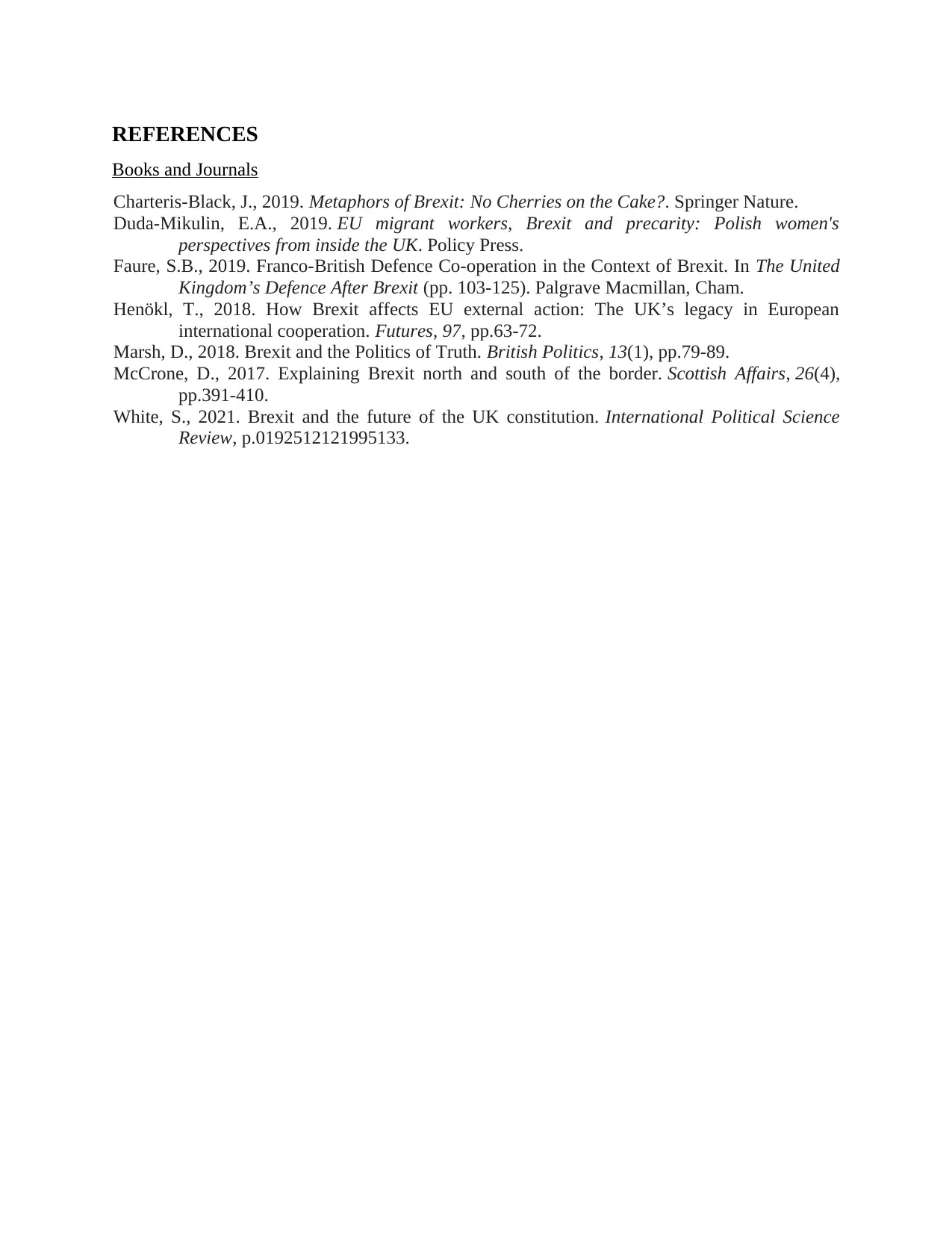
REFERENCES
Books and Journals
Charteris-Black, J., 2019. Metaphors of Brexit: No Cherries on the Cake?. Springer Nature.
Duda-Mikulin, E.A., 2019. EU migrant workers, Brexit and precarity: Polish women's
perspectives from inside the UK. Policy Press.
Faure, S.B., 2019. Franco-British Defence Co-operation in the Context of Brexit. In The United
Kingdom’s Defence After Brexit (pp. 103-125). Palgrave Macmillan, Cham.
Henökl, T., 2018. How Brexit affects EU external action: The UK’s legacy in European
international cooperation. Futures, 97, pp.63-72.
Marsh, D., 2018. Brexit and the Politics of Truth. British Politics, 13(1), pp.79-89.
McCrone, D., 2017. Explaining Brexit north and south of the border. Scottish Affairs, 26(4),
pp.391-410.
White, S., 2021. Brexit and the future of the UK constitution. International Political Science
Review, p.0192512121995133.
Books and Journals
Charteris-Black, J., 2019. Metaphors of Brexit: No Cherries on the Cake?. Springer Nature.
Duda-Mikulin, E.A., 2019. EU migrant workers, Brexit and precarity: Polish women's
perspectives from inside the UK. Policy Press.
Faure, S.B., 2019. Franco-British Defence Co-operation in the Context of Brexit. In The United
Kingdom’s Defence After Brexit (pp. 103-125). Palgrave Macmillan, Cham.
Henökl, T., 2018. How Brexit affects EU external action: The UK’s legacy in European
international cooperation. Futures, 97, pp.63-72.
Marsh, D., 2018. Brexit and the Politics of Truth. British Politics, 13(1), pp.79-89.
McCrone, D., 2017. Explaining Brexit north and south of the border. Scottish Affairs, 26(4),
pp.391-410.
White, S., 2021. Brexit and the future of the UK constitution. International Political Science
Review, p.0192512121995133.
1 out of 7
Related Documents
Your All-in-One AI-Powered Toolkit for Academic Success.
+13062052269
info@desklib.com
Available 24*7 on WhatsApp / Email
![[object Object]](/_next/static/media/star-bottom.7253800d.svg)
Unlock your academic potential
Copyright © 2020–2025 A2Z Services. All Rights Reserved. Developed and managed by ZUCOL.





